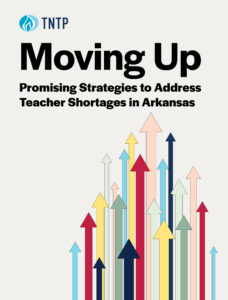Here at TNTP, I help school districts reimagine their processes for hiring and retaining great teachers for every classroom. But before I knew anything about so-called “human capital systems,” I knew a kid named Corey.*
Each of us has a story about how we came to this work, and why it matters to us. Corey is part of mine.
Five years ago, I was working with a local non-profit to coordinate an after-school tutoring program. Each of our volunteers was assigned a student to support, and I was lucky enough to get paired with Corey. It was my job to help him with homework, tackle his spelling words and visit with his teacher on a weekly basis to see how things were going in the classroom.
Corey was in third grade. He lived in extreme poverty and attended a school that has since been shut down. The school was failing, and so was Corey. He was a smart kid, but he struggled to read and was quickly falling further and further behind. To get him back on track, he desperately needed outstanding teachers and serious additional support.
I wish I could say that both of those things were delivered to Corey, but as is too often the case, they were not. When I started working with Corey, his teacher had just gone on leave.
The ill-equipped substitute who took her place could not keep Corey on task, so she decided to move him to the other third grade class in the middle of the school year. But the other third grade teacher didn't want Corey in her class either, and wasn't shy about telling me so. Inevitably, as the teacher disengaged from Corey, he also disengaged from learning. As you can imagine, my partnership with that teacher never really took off.
Later that spring, this teacher quit, leaving both third grade classrooms filled by substitutes. This remained the case for the rest of the school year. Despite our best efforts to support Corey after school, his entire third grade year was basically a loss. And despite it all, Corey was pushed through to fourth grade, thoroughly unprepared.
I wish the story turned around at this point, but sadly it doesn’t. Two weeks after the start of school, Corey’s fourth grade teacher was reassigned to another grade. It was three months before the position was filled permanently. When all was said and done, Corey had lost nearly two years of his education, simply because the district was unable to provide him with a quality teacher.
We know that Corey’s situation isn’t unusual. Urban schools have disproportionately higher rates of late and mid-year hires than more affluent suburban districts. On top of that, late hires are twice as likely to leave the teaching profession within a year of starting, in comparison to teachers hired on time. The bright side of this is that school districts from Boston to Shelby County, Tennessee are rethinking and reconfiguring the way they approach hiring teachers, simply by making it possible to fill positions earlier (which helps get the strongest teachers in the door) and by giving principals autonomy to choose the teachers who are the best fit for their schools.
These changes can make a big difference in the health of a school system and outcomes for students like Corey. We recently shared the story of Sherwood Middle School in Shelby County, which was able to fill almost all of its open teaching positions for next school year by the end of April, thanks to systemic changes in the way the district identifies teacher vacancies.
The phrase “human capital system” may sound like business mumbo-jumbo, but the most important word in it is “human.” These systems matter deeply for kids like Corey. A vacancy in a school isn’t just an open position: It’s a child without a teacher. That's why things like human capital systems, processes and policies matter to me. When we don’t get them right, it's kids like Corey who suffer the consequences.
We obviously have further work to do. There are still too many stories like Corey’s in schools across the country. But I do believe the game is changing. It may be happening slowly, but it is changing—and that matters.
*Corey’s name has been changed to protect his privacy.








